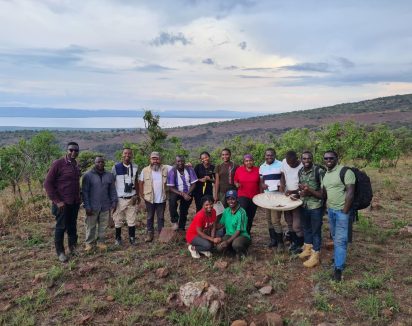
In depth training on ant taxonomy in Rwanda
Project details
2021
Rwanda
Taxonomy of ants Formicidae / Hymenoptera
Royal Belgian Institute of Natural Sciences
1) Center of Excellence in Biodiversity and Natural Resource Management (CoEB), University of Rwanda
2) African National Parks
For many invertebrate groups knowledge on their biodiversity and taxonomy are poorly assembled in the Afrotropical regions. Therefore, in October 2021 during an course organised by CEBioS and CoEB next to Nyungwe National Park in the south-west of Rwanda, ants were collected in tropical mountain rainforest by 11 African students and 5 promotors (both African and European).
This resulted in the development of a very motivated group of young scientists and future myrmecologists settled and hosted by CoEB and African National Parks. Moreover this team was able to add more than 60 new country records during only a few days of field work. Despite this important step, the ant fauna of Rwanda remains still poorly studied. During a second ant course of 8 days (organised with the same local partners), the same group myrmecologist formed during the first ant course, were offered an in depth training on ant taxonomy in a savanna ecosystem at Akagera National Park.
The skills developed during the earlier ant course were updated and enlarged. These included field work, sampling treatment, identification and collection management. This second ant course in Rwanda aimed to tackle the restricted knowledge on ant biodiversity and will increase the taxonomical knowledge platform of this insect group in Rwanda.
Participants were selected amongst the participants from the Ant course Nyungwe in 2021 and some new ones were added. They had to send an motivation letter to the local partner. A selection of the best candidates was made. Criteria were: did they already participated last year, what activities have they done in the year between first and second ant course, their CV, …. The target group was young scientist from Rwanda and nearby countries working on ants or insects. Participants had different backgrounds: PhD candidates, Master, Master-students, Bachelor, Bachelor-students, collaborators of African Parks. Female participants were favored and encouraged to participate.
We had a total of 15 participants gender-balanced (6 female/ 9 male participants) : two participants from Tanzania, one from DRCongo, one from Kenya, one from South-Africa and 9 participants from Rwanda from different institutes.
Rwanda: Diane Umutoni + Adrien Nkundimana (African National Parks, Akagera NP); Fulgence Shumbusho (College of Education, University of Rwanda); Jean Aimé Ruticumugambi (Integrated Polytechnic Regional College Kitabi); Fabrice Rwasimitana (International Centre of Insect and Physiology and Ecology, Rwanda (ICIPE), Kigali); Jean de Dieu Nsenganeza + Thacien Hagenimana + Jeannette Uwitonze (CoEB); Simon Mpayimana + Aisha Nyiramana (Department of Biology, School of Science, CST-UR); RDCongo: Olivier Basima Kizungu (Centre de Recherche en Sciences Naturelles, Lwiro); Tanzania: Esther Vicent Kimario (Tanzania Wildlife Research Institute (TAWIRI) + Marylove Gasper (Sokoine University (SUA), Department of Wildlife, Morogoro); Kenya: Jairus Shisungu Anale (Department of Biological Sciences, Masinde Muliro University of Science and Technology); South-Africa: Daniella Molenaar (Afribugs, Assistant Environmental Consultant)
5 Instructors: Wouter Dekoninck (Belgium, RBINS), Venuste Nsengimana (Rwanda CoEB), Francisco Manuel Gomez Abal (Spain), Lombart M.M Kouakou (Ivory Coast, Université Nangui Abrogoua), Peter Hawkes (South Africa, Research Associate, University of Venda for Science and Technology, Limpopo).
A high number of people was trained and the number of 15 students was correctly estimated to be possible. The high instructor/student ratio allowed instructors to supervise the participants individually. As such they were easily available for questions or needs of supplementary information. In addition, the complementary experiences and specialties of the instructors contributed to the high-quality level of the course.
Scientifically this ant course was again a success and will contribute significantly to the knowledge of the distribution and biodiversity of ants in Rwanda. We estimate to add probably again 40 species to the ant list. Also some new species for science were discovered. So far we have several publications already in progress. As for the first ant course we will again publish a complete list of ant species for the Park we visited. All participants and instructors will be co-authors and the first author will be the local promotor. Moreover several short communications on new species records for the country are in preparation. These are records of not yet recorded ant species collected by participants and projects in the year between the two courses.
– NSENGIMANA et al. in prep. Checklist of ant species from a savanna ecosystem in Eastern Africa; Akagera National Park, Rwanda
– NSENGIMANA V & DEKONINCK W, submitted. First Records of the ant species Odontomachus assiniensis Emery, 1892 (Hymenoptera: Formicidae) from Rwanda.
– NSENGIMANA V et al. in prep. Three new ant species for Rwanda collected at Huye.
Before leaving Kigali for Akagera National Park the instructors and a delegation of CoEB had a meeting at the offices of the Ministry of Environment. We met the Permanent Secretary of the Ministry of Environment Patrick KABERA together with Mrs Beatrice CYIZA, the General Director of Environment and Climate Change in the Ministry of Environment. We were scheduled for a 30 minutes meeting to explain our projects, however we had a very interesting and fruitful discussion of almost two hours, where we highlighted why we study ants, how we study ants, and why knowledge of biodiversity in Rwanda is so important for the Afrotropics.
For this meeting a poster was created and handed over to the delegation of the Minister of Environment.